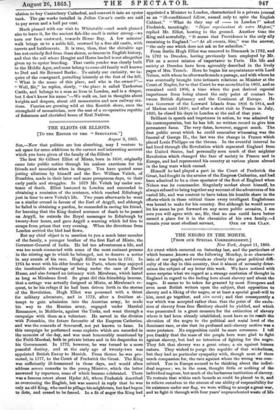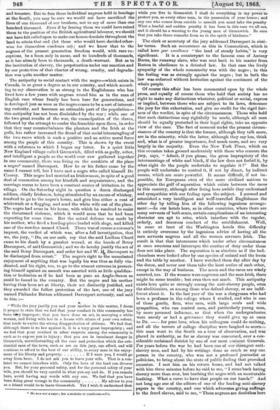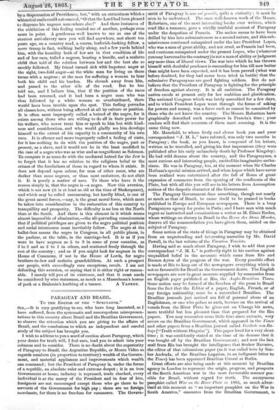THE NEGRO IN THE NORTH.
FROM OUR SPECIAL CORRESPONDENT.]
New York, August 11, 1865. AN event which occurred on Saturday last, and the particulars of which became .known on the following Monday, is so character- istic of our people, and reveals so clearly the great political diffi- culty of the day in this country, that it almost of necessity deter- mines the subject of my letter this week. We have noticed with some surprise what we regard as a strange confusion of thought in England in regard to the feeling here about slavery and about the negro. It seems to be taken for granted by most European and even most British writers upon the subject, that opposition to slavery and a liking of the negro, or at least a special good-will to him, must go together, and vice versa; and that consequently a war which was accepted rather than that the point of the exclu- sion of slavery from free territory should be yielded, and which was prosecuted in a great measure for the extinction of slavery where it had been already established, must have as its result the elevation of the negro to the political and social level of the dominant race, or else that its professed anti-slavery motive was a mere pretence. No supposition could be more erroneous. I tell you frankly that the mass of the people here were glad to fight against slavery, but had no intention of fighting for the negro. They felt that slavery was a great crime, a sin against human nature. They wished to purge the republic of that wickedness, but they had no particular sympathy with, though most of them much compassion for, the race against whom the wrong was corn - miffed. You in Europe seemed to be thinking about the indivi- dual negroes ; we, in the mass, thought little or nothing of the individual negroes, but much of the barbarous institution of slavery. To restrain that within such bounds as could be placed to it, and to relieve ourselves to the utmost of our ability of responsibility for its existence under our flag, we were willing to accept a great war, and to fight it through with four years' unprecedented waste of life
and treasure. But to free those individual negroes held in bondage at the South, you may be sure we would not have sacrificed the lives of one thousand of our brothers, not to say of more than one hundred thousand. Even if by freeing them we could have raised them to the position of the British agricultural labourer, we should not have felt called upon to make our homes desolate throughout the land to attain that end (let those who would have decided other- wise for themselves condemn us) ; and we knew that to the negroes of the present generation freedom would, with rare ex- ceptions, be a boon only in name, and to hundreds of thousands, as it has already been to thousands, a death-warrant. But as to the institution of slavery, the perpetuation under our sanction and by our protection of that charter of wrong, cruelty, and degrada- tion was quite another matter.
The antipathy to social contact with the negro—which exists in Canada, in as great a degree as in our country, and which accord- ing to my observation is as strong in the Englishman who has lived here a few years with negroes round him as in the man of English race whose family has been here for generations, and is developed just as soon as the negro ceases to be a sort of interest- ing curiosity, and becomes an estimable part of the population— this antipathy has not been diminished by the war ; while one of the two great results of the war, the emancipation of the slaves, followed by the attempt to confer the franchise upon them, in order that they may counterbalance the planters and the Irish at the polls, has rather increased the dread of that social intermingling of the two races which is such a positive and an active moral force among the people of this country. This is shown by the event with a reference to which I began my letter. In a quiet little New England village called Greenwich, filled with as godly, sober, and intelligent a people as the world ever saw gathered together in one community, there was living on the outskirts of the place a negro* named Davenport. How he or his father came by the name I cannot tell, but I have met a negro who called himself De Courcy. This negro had married an Irishwoman, in spite of a good deal of commotion among her kinsfolk and acquaintance, and the marriage seems to have been a constant source of irritation in the village. On the Saturday night in question a dozen discharged soldiers, chiefly Irishmen, being stimulated by an excess of whiskey, resolved to go to the negro's house, and give him either a coat of whitewash or a flogging, and send the white wife out of the place. The negro had arms in his house, with which he resolved to resist the threatened violence, which it would seem that he had been expecting for some time. But the actual defence was made by his mother, who fired a fowling-piece loaded with slugs, and killed one of the rowdies named Chard. There was of course a coroner's inquest, the verdict of which was, after a full investigation, that we, the jury, "Do, on our oath, say that the said Ludlam Chard came to his death by a gunshot wound, at the hands of Betsy Davenport, of said G-reenvrich; and we do hereby justify the act of the said Betsy Davenport, and order her and W. Et Davenport to be discharged from arrest." The negro's right to flee unmolested enjoyment of anything that was legally his was thus as fully vin- dicated, and his right, too, to go to the utmost extreme in protect- ing himself against an assault was asserted with as little qualifica- tion or hesitation as if he had been as pure an Anglo-Saxon as could be found in the country. lBut the negro and his mother having thus been set at liberty, their act distinctly justified, and they awarded the fullest protection of the law, one of the jury named Philander Button addressed Davenport seriously, and said to him
at
" While the jury justify you and your mother in this matter, I deem it proper to state that we feel that your conduct in this community has been v*y improper; that you have done an act, in marrying a white woman, and living with her in a house with others of your own colour, that tends to excite the strong disapprobation of citizens. We feel that, although there is no law against it, it is a very great impropriety ; and we feel that your conduct in other respects among the community is such as to expose you to injury ; that you are in imminent danger in Greenwich, notwithstanding all the care and protection which the sub- stantial men of the town, such as are on this jury, can afford, and will continue to afford to the best of oar ability, to every man in the enjoy- ment of his liberty and property If I were you, I would go away from here. I do not ask you to leave your wife. That is a con- tract we cannot interfere with. Only the laws of the land can divorce you. But, for your personal safety, and for the personal safety of your wife, you should be very careful in what you say and do. If you remain here, avoid having any words with any one. We feel that you have been doing great wrongs in the community My advice to you as a friend would be to leave Greenwich. Yet I wish it understood that
• He was not a negra, but a mulatto or quadroon.—ED.
while you live in Greenwich I shall do everything in my power to protect you, as every other man, in the possession of your house ; and any one who comes from outside to assault you must take the:penalty What a fearful and sudden penalty it has been in this case we all see, and it should he a warning to the young men of Greenwich. Be sure that you take these remarks from us in the spirit of kindness."
The clerk or secretary of the jury addressed Davenport in simi- lar terms. Such an occurrence as this in Connecticut, which is called here par excellence " the land of steady habits," is very significant. It is a counterpart to the famous case of Antony Burns, the runaway slave, who was sent back to his master from Boston in obedience to a detested law. In that case the lively sympathy of the whole community was with the negro ; in this the feeling was as strongly against the negro ; but in both the law was enforced without hesitation against the sentiment of the whole people.
Of course this affair has been commented upon by the whole press, and equally of course those who hold that society has no right to make any distinctions whatever, political or social, express or implied, between those who are subject to its laws, denounce the jury for this exhortation, and give no credit for the rigid fair- ness of the verdict, in spite of the circumstances. Those who hold that such distinctions may rightfully be made, although all men should be equally protected in their legal rights, take an opposite view of the case. The fact of moment under the present circum- stances of the country is that the former, although they talk more, are in the minority, while the latter, although they say less, think and, what is of greater importance, feel much more, and are very largely in the majority. Even the New. York Times, which on this occasion takes ground moderately with those who censure the jury, says, " Admit, if you please, the gross impropriety of the intermarriage of white and black, if the law does not forbid it, by what right do the people undertake to regulate it ?" But the people will undertake to control it, if not by direct, by indirect means, which are more powerful. It seems difficult, if not im- possible, for Europeans even of the more civilized nations to appreciate the gulf of separation which exists between the races in this country, although after living here awhile they understand and sympathize with our feeling upon the subject. I amused and astonished a very intelligent and weir-travelled Englishman the other day by telling him of the following ingenious arrange- ment :—In our hotels here, as in other countries, where there are many servants of both sexes, certain complications of an interesting character are apt to arise, which interfere with the regular, orderly, and decorous conduct of the establishment. Well, in some at least of the Washington hotels this difficulty is entirely overcome by the ingenious advice of having all the men servants negroes and all the women servants Irish. The result is that that intercourse which under other circumstances at once sweetens and interrupts the routine of duty under these does not take place. The separation is as absolute as if the bed- chambers were looked after by one species of animal and the boots and the table by another. I have watched them day after day by the dozen, and never saw them take the least notice of each other, except in the way of business. The sexes and the races are wisely assorted, too. If the women were negresse.s and the men Irish, there might be some trouble ; but even then not much. This antipathy exists here quite as strongly among the anti-slavery people, even the abolitionists, as among those who defend slavery, or are indif- ferent about it. In the last year of the war a clergyman who had been a professor in the college where I studied, and who, is one of those gentle, firm, wise men, with large souls and wide sympathies, who can control men, and particularly young men, by mere personal influence, so that when the undergraduates were unruly or had a grievance they would give up at once to Dr. --- for pure love, when his colleagues could do nothing, and all the terrors of college discipline were laughed to scorn— this man went to the South on a tour of observation, and was placed in authority, as far as slavery was concerned, over a con- siderable reclaimed district by one of our most eminent Generals. For years before the war he had been one of our strongest anti- slavery men, and had by his writings done as mach as any one person in the country, who was not a professed journalist or politician, to bring about the state of public feeling that provoked secession. I met him on his return home, and had not talked with him three minutes before he said to me, " I come back hating slavery more than ever, but loathing the negro with an unutterable loathing. What a curse to have that people on our hands!" And not long ago one of the editors of one of the leading anti-slavery papers in the country, and one which advocates giving suffrage to the freed slaves, said to me, " These negroes are doubtless here
by a dispensation of Providence, but," with an earnestness 'Winch a whimsical smilecoold not conceal, "0 that the Lord had been pleased to dispense his negroes somewhere else !" And these instances of the exhibition of this feeling remind me of another, perhaps even more in point. A gentleman well known to me as one of the stoutest anti2slavery men you will find anywhere, met about ten years ago, on a country road, a coarse, loaferish-looking fellow, a mere tramp in fact, walking lazily along, and a few yards behind him, with the humility both of her sex in that condition of life and of her race, toiled a negress, bearing a bundle, and a mulatto child that told 'of the relation between her and the lout she so meekly followed. My friend turned sick with impotent anger at the sight, two-fold anger—at the white man for living on those terms with a negreas ; at the man for suffering a woman to bear both his child and his burden. He shrunk away from him, and passed to the other side of the road. But he has told me, and I believe him, that if the position of the races had been reversed, and it had been a negro man who was thus followed by a white woman so overburdened, there would have been trouble upon the spot. This feeling pervades all classes here, without being affected at all by culture or position. It is often most improperly called a hatred of the negro, for it exists among those who are willing to do all in their power for his welfare, who never treat him or speak to him but with kind- ness and consideration, and who would gladly see him develtilie himself to the extent of his capacity in a community of his own race. It is oftener and more improperly called a feeling of caste, for it has nothing to do with the position of the negro, past or present, as a slave, and it would not be in the least modified In the case of a negro who was as wise and as magnificent as Solomon. To compare it as some do with the medigeval hatred for the Jew is to forget that it has no relation to the religious belief Or the crimes of the forefathers of those in regard to whom it exists. It does not depend upon colour, for men of other races, ivhci are darker than some negroes, or than most mulattoes, do not elicit it. It is purely a matter of race. To those who have it the reason simply is, that the negro is—a negro. Now this aversion, which is not new (it is at least as old as the time of Shakespeare), and which may be called unreasoning, but hardly blind, is one Of the great moral forces, —nay, is the great moral force, which must be taken into consideration in the restoration of this country to tranquillity and prosperity. The difficulty is no less at the North than at the South. And there is this element in it which seems almost impossible of elimination,—the all-pervading consciousness that if political privileges are given to the negro political position and social intercourse must inevitably follow. The negro at the ballot-boa means the negro in Congress, in all public places, in the parlour, at the table, in the Marriage-bed. It is as if you were to have negroes as 5 to 3 in some of your counties, as 3 to 2 and as 2 to 1 in others, and scattered freely through the rest of the country ; and as if you might look for negroes in the House of Commons, if not in the House of Lords, for negro brothers-in-law and mulatto. grandchildren. At such a prospect our people, with exceedingly rare exceptions, revolt. I am not defending this aversion, or saying that it is either right or reason- able. I merely tell you of its existence, and that it must needs be considered by wise statesmen, as much as a Mussulman's horror of pork or a Brahmin's loathing of a tanner. A YANKEE.
































 Previous page
Previous page